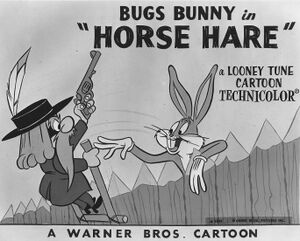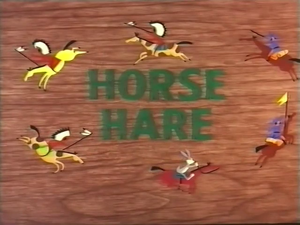Difference between revisions of "Horse Hare"
m (→Locations: When do we need years for specific locations?) |
|||
| (4 intermediate revisions by one other user not shown) | |||
| Line 5: | Line 5: | ||
|prodcompany= [[Warner Bros. Cartoons]] | |prodcompany= [[Warner Bros. Cartoons]] | ||
|distributor= [[Warner Bros. Pictures]]<br />[[The Vitaphone Corporation]] | |distributor= [[Warner Bros. Pictures]]<br />[[The Vitaphone Corporation]] | ||
|released= [[ | |released= [[February 3]], [[1960]] | ||
|run_time= | |run_time= | ||
|starring= [[Mel Blanc]] | |starring= [[Mel Blanc]] | ||
| Line 17: | Line 17: | ||
|title_card= [[File:Horse Hare Title Card.png|300px]] | |title_card= [[File:Horse Hare Title Card.png|300px]] | ||
}} | }} | ||
'''''Horse Hare''''' is the four hundred and tenth ''[[Looney Tunes (theatrical shorts)|Looney Tunes]]'' theatrical short. It was published by [[Warner Bros. Pictures]] and [[The Vitaphone Corporation]] on [[ | '''''Horse Hare''''' is the four hundred and tenth ''[[Looney Tunes (theatrical shorts)|Looney Tunes]]'' theatrical short. It was published by [[Warner Bros. Pictures]] and [[The Vitaphone Corporation]] on [[February 3]], [[1960]]. It was written by [[Michael Maltese]], produced by [[John W. Burton]], and directed by [[Friz Freleng]]. | ||
While Sergeant Bugs Bunny is assigned to protect a U.S. Calvary Fortress outpost, Fort Lariat, from invaders, Renegade Sam launches an Indian assault on the fortress. | While Sergeant Bugs Bunny is assigned to protect a U.S. Calvary Fortress outpost, Fort Lariat, from invaders, Renegade Sam launches an Indian assault on the fortress. | ||
==Memorable quotes== | ==Memorable quotes== | ||
'''Bugs:''' Uh-oh. Sorry, that one was a half-breed. | '''Bugs:''' (shoots rifle three times) ''One little, two little, three little Indians...'' (shoots rifle three more times) ''Four little, five little, six little Indian-'' Uh-oh. Sorry, that one was a half-breed. (shoots rifle three more times) ''Seven little, eight little, nine little Indians...'' (whams an Indian behind him) ''TEN little Indian boys.'' | ||
| Line 38: | Line 38: | ||
|style="background-color:white"| Mel Blanc | |style="background-color:white"| Mel Blanc | ||
|- | |- | ||
|style="background-color:#d2d2ff"| | |style="background-color:#d2d2ff"| Donkey | ||
|style="background-color:#aaffaa"| Mel Blanc | |style="background-color:#aaffaa"| Mel Blanc | ||
|- | |- | ||
| Line 61: | Line 61: | ||
Dates are in order of release: | Dates are in order of release: | ||
* United States: | * United States: February 3, 1960 in theatres | ||
==Behind the scenes== | ==Behind the scenes== | ||
* | * The title is another pun of the "hair/hare" titles. This one is based on 'horsehair'. | ||
* Like ''[[Slightly Daffy]]'' and ''[[Tom Tom Tomcat]]'', this cartoon reuses the ''Ten Little Indians'' gag from those cartoons. | |||
==Errors== | ==Errors== | ||
* | * | ||
==Everlasting influence== | ==Everlasting influence== | ||
* The short was featured as part of the unaired ''[[Toonheads]]'' episode "[[The Twelve Missing Hares]]," due to its inclusion of outdated Native American stereotypes. | * The short was featured as part of the unaired ''[[Toonheads]]'' episode "[[The Twelve Missing Hares]]," due to its inclusion of outdated Native American stereotypes. | ||
* The plot of this short would be remade into a ''Roland and Ratfink'' cartoon entitled, ''Trick or Retreat''. | |||
==In other languages== | ==In other languages== | ||
Latest revision as of 03:56, 20 May 2024
| WARNING! This page contains content that may not be seen as age appropriate, and may also be considered offensive or upsetting for some readers. It may contain references to outdated Native American stereotypes. Reader discretion is advised. |
| Horse Hare | |
|---|---|
 Lobby card. | |
| Production company | Warner Bros. Cartoons |
| Distributor | Warner Bros. Pictures The Vitaphone Corporation |
| Release date | February 3, 1960 |
| Starring | Mel Blanc |
| Producer(s) | John W. Burton |
| Music composed by | Milt Franklyn |
| Story by | Michael Maltese |
| Animation | Gerry Chiniquy Virgil Ross Art Davis |
| Director(s) | Friz Freleng |
| Series navigation | |
| ← Previous | Next → |
| Title card | |

| |
Horse Hare is the four hundred and tenth Looney Tunes theatrical short. It was published by Warner Bros. Pictures and The Vitaphone Corporation on February 3, 1960. It was written by Michael Maltese, produced by John W. Burton, and directed by Friz Freleng.
While Sergeant Bugs Bunny is assigned to protect a U.S. Calvary Fortress outpost, Fort Lariat, from invaders, Renegade Sam launches an Indian assault on the fortress.
Memorable quotes
Bugs: (shoots rifle three times) One little, two little, three little Indians... (shoots rifle three more times) Four little, five little, six little Indian- Uh-oh. Sorry, that one was a half-breed. (shoots rifle three more times) Seven little, eight little, nine little Indians... (whams an Indian behind him) TEN little Indian boys.
Sam: I hate you!
Donkey: And I hate you.
Bugs: And me? I love everybody!
Characters
In order of appearance: | ||||||||||
| ||||||||||
Locations
Objects
Production
Development
Although this short has no credits for the writer, it is presumed that an uncredited Michael Maltese had worked on it.
Music
The music was composed by Milt Franklyn.
Release
Dates are in order of release:
- United States: February 3, 1960 in theatres
Behind the scenes
- The title is another pun of the "hair/hare" titles. This one is based on 'horsehair'.
- Like Slightly Daffy and Tom Tom Tomcat, this cartoon reuses the Ten Little Indians gag from those cartoons.
Errors
Everlasting influence
- The short was featured as part of the unaired Toonheads episode "The Twelve Missing Hares," due to its inclusion of outdated Native American stereotypes.
- The plot of this short would be remade into a Roland and Ratfink cartoon entitled, Trick or Retreat.
In other languages
| Language | Name | Meaning |
|---|---|---|
Home availability
- In the United States:
- The Looney Tunes Video Show (Volume 12, VHS)